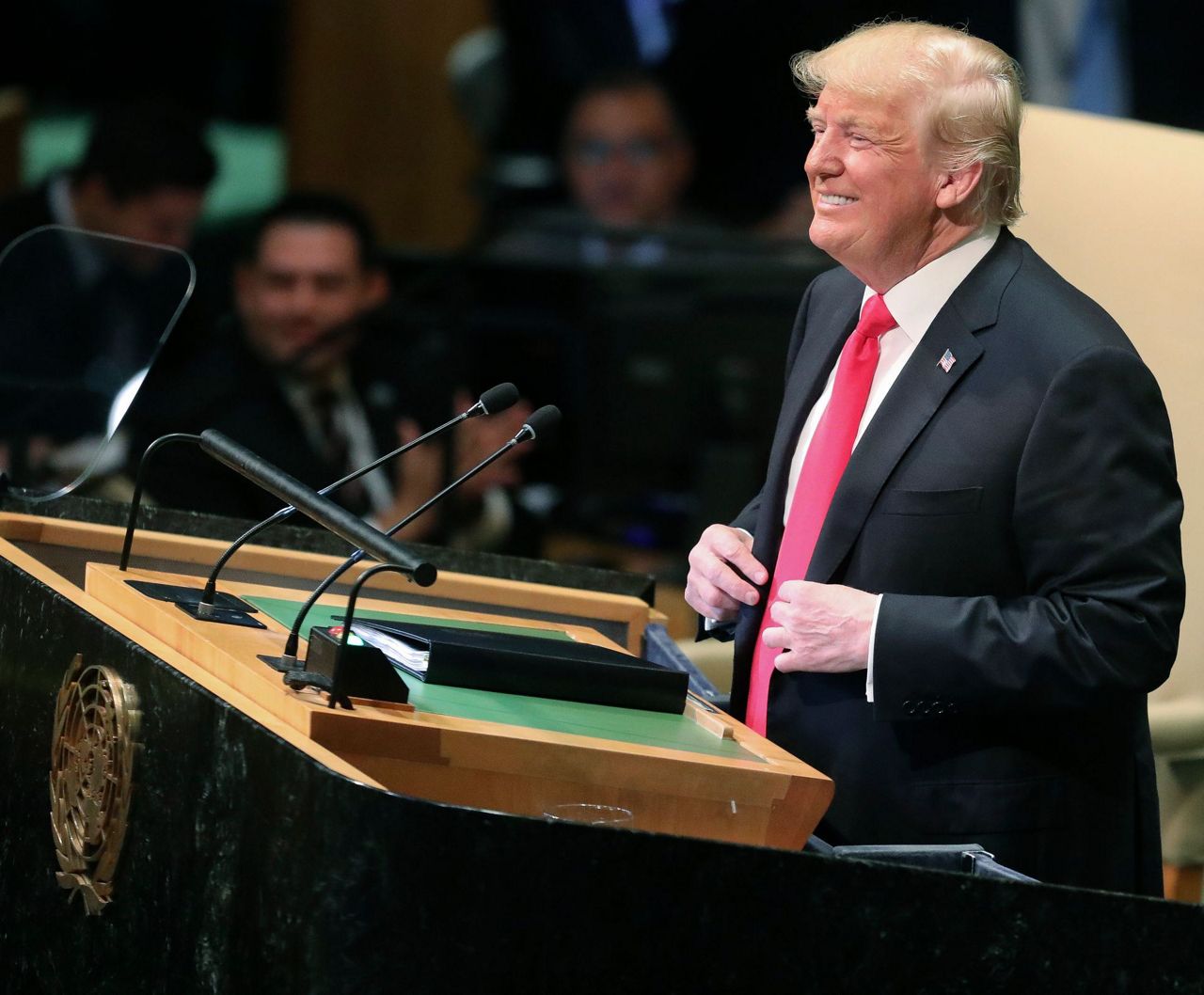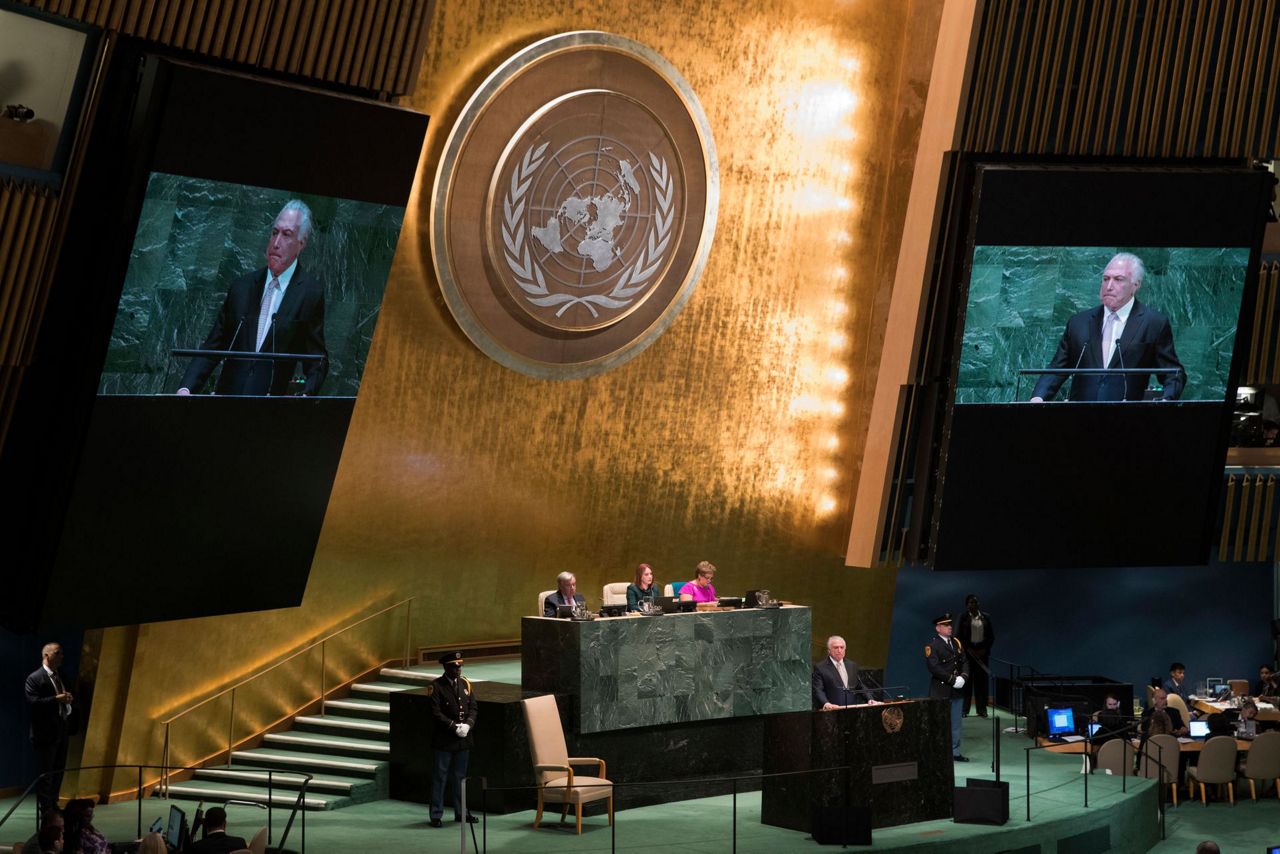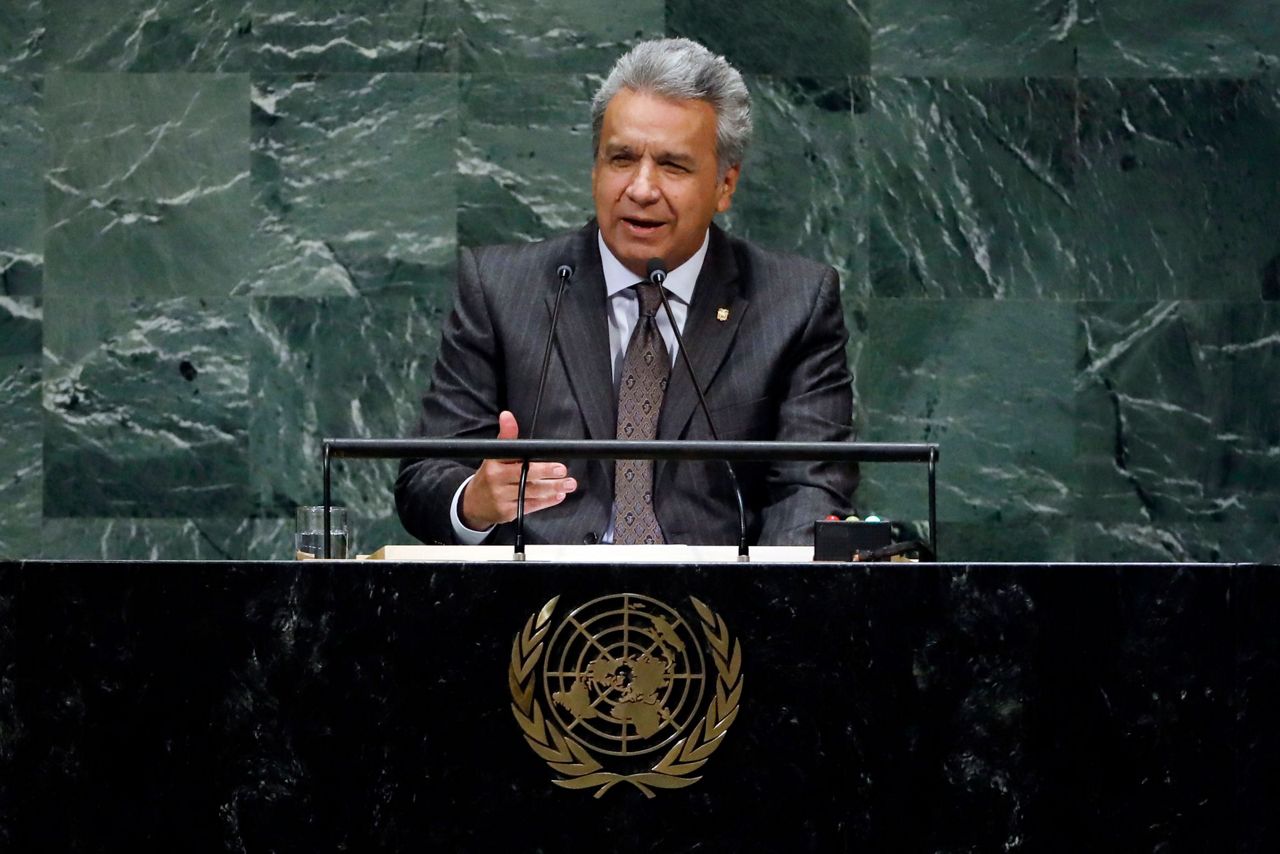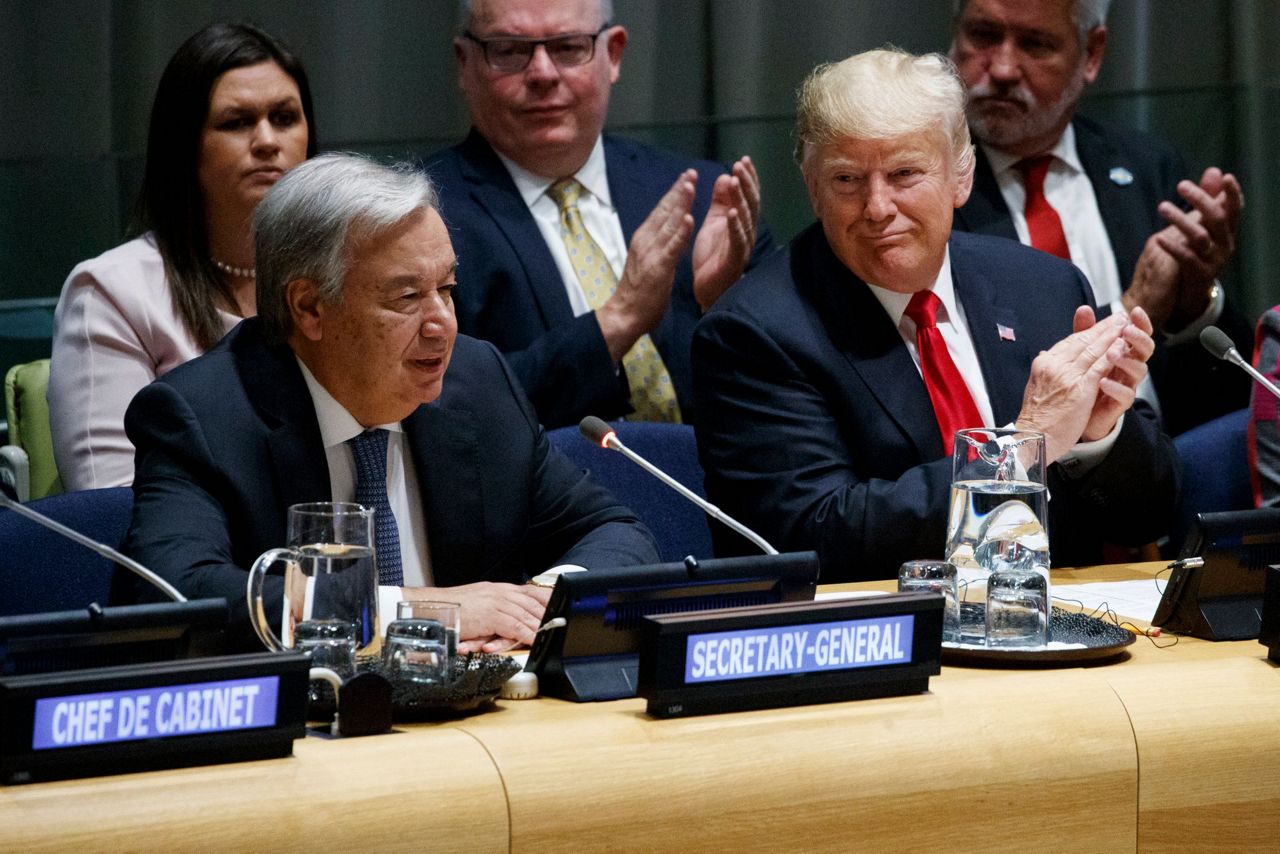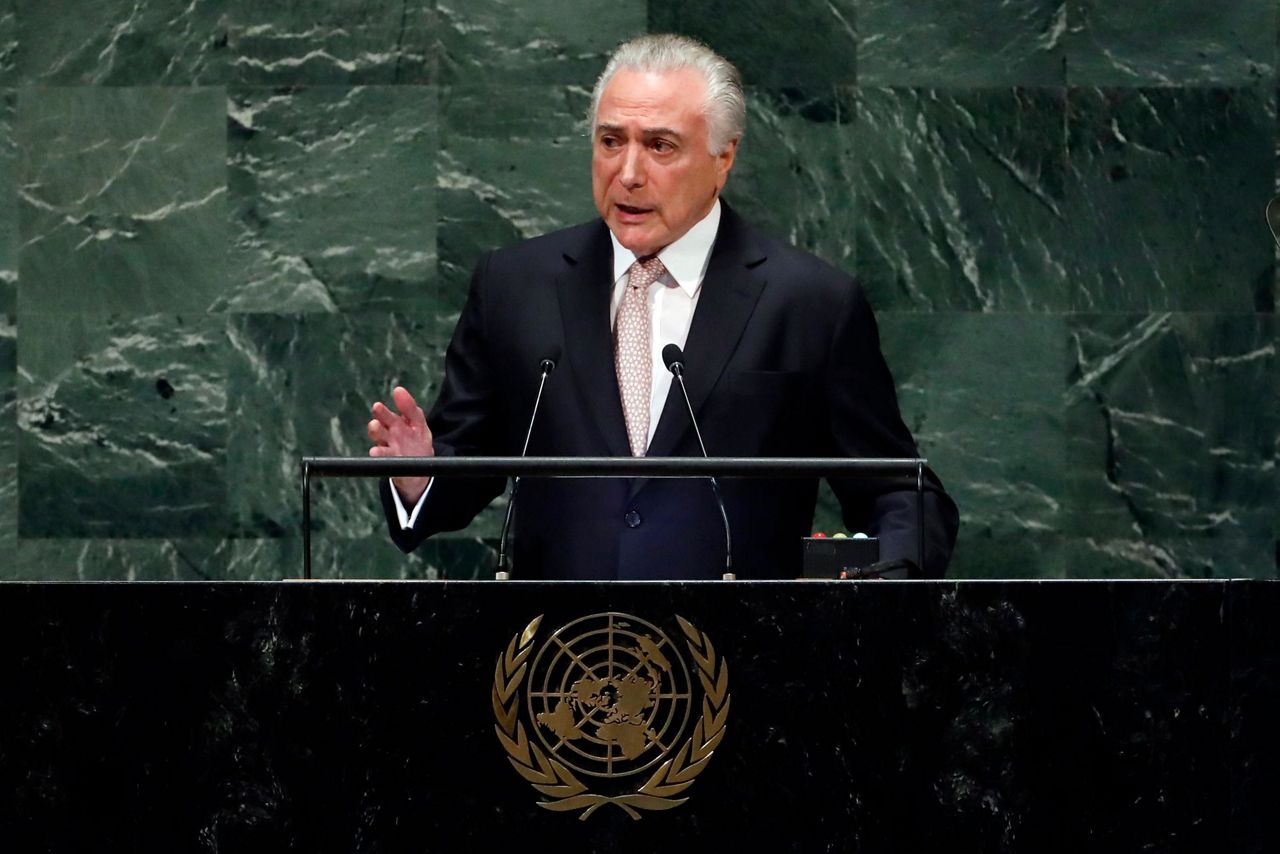UNITED NATIONS (AP) — The Latest on the United Nations General Assembly (all times local):
12 p.m.
Turkish President Recep Tayyip Erdogan says the U.N. risks becoming an organization with "a reputation for failure" and catering to just five world powers unless it's restructured, particularly in the Security Council.
Erdogan told world leaders at the General Assembly on Tuesday that the U.N. has "moved away from the capacity to meet the expectations of humanity through peace and welfare."
He referenced Bosnia, Rwanda and the plight of the Palestinians and said the world body must be restructured if it is to succeed.
In his words, "We believe that when we say the world is greater than five, we are becoming the voice of the common conscience of the human race." That's a reference to the U.S., China, Russia, France and Britain, the Security Council's five permanent members and the only ones with veto power.
___
11:50 a.m.
Israel's Ambassador to the United Nations says that President Donald Trump's speech to the global body proves that the US "is on the right side of history."
Ambassador Danny Danon says that the U.S. is leading the "United Nations into a new era that ends its obsession with Israel, and pushes back against the Iranian regime." He made the remarks in a statement shortly after Trump's speech at the U.N. General Assembly on Tuesday.
In his speech, Trump asked the world's nations to join the U.S. in isolating Iran over behavior he deems aggressive. He says a regime that chants "death to America" and threatens Israel with destruction must not be allowed to have the means to deliver a nuclear warhead.
___
11:30 a.m.
Brazil's president is urging world leaders to reject growing trends for isolationism and intolerance and recommit to defending international cooperation and improving the United Nations.
President Michel Temer told the U.N. General Assembly on Tuesday that his administration has done its part by increasingly opening Brazil's economy and by welcoming Venezuelans fleeing their country's economic collapse.
Temer stressed the importance of the United Nations in a world where countries are increasingly advocating going it alone.
But he also said the body needs significant reforms to become more effective and legitimate. He said that the Security Council as it currently stands reflects a world that no longer exists. Brazil and other countries have advocated expanding the number of countries that sit on the Security Council, including the number of permanent members.
___
10:20 a.m.
U.S. President Donald Trump is holding up the whole world.
Trump ran a bit late for his once-a-year speech at the U.N. General Assembly, forcing organizers to change the order of speakers.
Trump was scheduled to speak second at Tuesday's session, after Brazilian President Michel Temer.
Instead, Temer's speech was followed by an awkward pause, as U.N. officials prepared the podium to accommodate the No. 3 speaker, Ecuador's President Lenin Moreno, who is in a wheelchair.
Trump's motorcade arrived during Moreno's speech at the U.N. headquarters in New York.
The White House did not immediately explain why Trump was running late. Trump's America-first policies and criticism of allies has clashed with the multilateral spirit of the U.N. General Assembly.
___
9:50 a.m.
Germany's foreign minister is warning that too much pressure on Iran might lead Tehran to resume its military nuclear program and destabilize the entire Middle East.
Heiko Maas told reporters in New York on Tuesday that three European Union countries, Russia and China agreed overnight to try to maintain the 2015 nuclear deal with Iran despite the U.S. pullout.
Maas said "There was great unanimity among those involved that we want to keep this deal alive, that we want to soften the consequences resulting from U.S. sanctions." He said this includes facilitating payments for Iran's exports.
Maas added that Germany's worry is "that under greatest possible pressure Iran might one day resume military nuclear use again. We don't want this because it would set the entire region ablaze"
___
9:40 a.m.
U.N. Secretary-General Antonio Guterres is calling technology advances one of the "epochal challenges" facing the world.
Speaking Tuesday at the General Assembly gathering of world leaders, Guterres says the promise of such developing technologies as artificial intelligence, blockchain and biotech is tempered by risks and "serious dangers."
He notes that technology stands to change or eliminate some jobs and is a tool in the hands of terrorists, cybercriminals and creators of disinformation campaigns. And he worries about the possibility of artificially intelligent weapons that could choose their own targets.
Guterres declares that "the prospect of machines with the discretion and power to take human life is morally repugnant."
He also notes that people increasingly are getting information from social media feeds and outlets that echo their views and "reinforce tribalism."
___
9:20 a.m.
U.N. Secretary-General Antonio Guterres says the world has reached "a pivotal moment" in global warming and risks runaway climate change if leaders don't act in the next two years.
He is telling world leaders at the U.N. General Assembly that they aren't doing enough to combat what he calls "a direct existential threat" that is moving faster than people are working to combat it.
He notes that thick, permanent sea ice north of Greenland began to break up this year for the first time.
He's calling for making sure the international Paris climate change agreement is implemented. U.S. President Donald Trump has announced he's withdrawing his country from the pact.
Guterres is planning a climate summit next year.
___
9:15
U.N, Secretary-General Antonio Guterres says the principle of multinational cooperation "is under fire precisely when we need it most."
The U.N. chief is issuing a sweeping appeal to revive multilateralism as he speaks Tuesday at the opening of the U.N. General Assembly.
He says that at a time of "massive, existential threats" to people and the planet, "there is no way forward but collective, common-sense action for the common good."
Guterres is warning of rising populism and polarization within nations. He says their leaders have the duty to improve their people's well-being, but also to "promote and support a reformed, reinvigorated and strengthened multilateral system."
___
9:05
U.N. Secretary-General Antonio Guterres is telling leaders from around the world that it "is suffering from a bad case of 'Trust Deficit Disorder.'"
The U.N. chief is painting a bleak picture in his speech as the General Assembly's top-level gathering opens Tuesday. He points to rising polarization and populism within nations, ebbing cooperation among them and "fragile" trust in international institutions.
And Guterres says "democratic principles are under siege."
Presidents, prime ministers, monarchs and high-ranking ministers from 133 countries have signed up to attend the weeklong session. Among them are many defenders of the international order, but also such populist leaders as U.S. President Donald Trump, Polish President Andrzej Duda and Italian Premier Giuseppe Conte.
___
8:45 a.m.
Secretary-General Antonio Guterres is expected to paint a grim picture of the state of the world as leaders open their annual meeting Tuesday, spotlighting the breakdown of trust around the globe and the need to counter unilateralism and reinvigorate international cooperation which is the foundation of the United Nations.
U.N. deputy spokesman Farhan Haq gave a preview the U.N. chief's address saying he will "also sound the alarm on climate change" and stress that all people must benefit from new technologies "while safeguarding against the dangers from malicious acts in cyberspace to the weaponization of artificial intelligence."
He said Guterres will also appeal to world leaders "for greater solidarity in advancing peace, human rights and sustainable development," he said.
This year, 133 world leaders have signed up to attend the General Assembly session, up from 114 leaders last year.
Copyright 2018 The Associated Press. All rights reserved. This material may not be published, broadcast, rewritten or redistributed.



